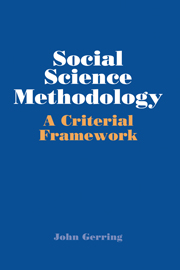3 - Concepts: General Criteria
Published online by Cambridge University Press: 05 June 2012
Summary
As we are … prisoners of the words we pick, we had better pick them well.
–Giovanni SartoriConcept formation concerns the most basic question of social science research: What are we talking about? Specifically, how do we make connections between the phenomenal world, the presumed subject matter of social science, and the linguistic world within which social science takes form? Concept formation thus lies at the heart of all social science endeavor. It is impossible to conduct work without using concepts. It is impossible even to conceptualize a topic, as the term suggests, without putting a label on it.
More important, concepts are not static. Work on a subject necessarily involves reconceptualization of that subject. Work on the nation-state, for example, if at all persuasive, alters our understanding of “nation-state.” No use of language is semantically neutral. Authors make lexical and semantic choices as they write and thus participate, wittingly or unwittingly, in an ongoing interpretive battle. This is so because language is the tool kit with which we conduct our work, as well as the substance on which we work. Progress in the cultural sciences occurs, if it occurs at all, through changing terms and definitions. This is how we map the changing terrain.
But all is not well in the land of concepts. For many years it has been a standard complaint that the terminology of social science lacks the clarity and constancy of the natural science lexicon.
- Type
- Chapter
- Information
- Social Science MethodologyA Criterial Framework, pp. 35 - 64Publisher: Cambridge University PressPrint publication year: 2001
- 1
- Cited by



